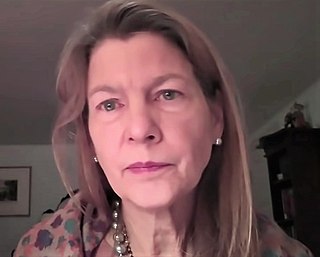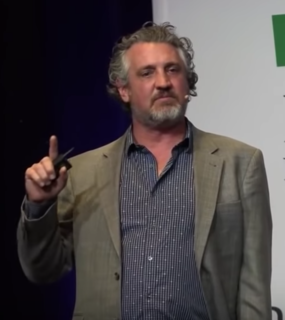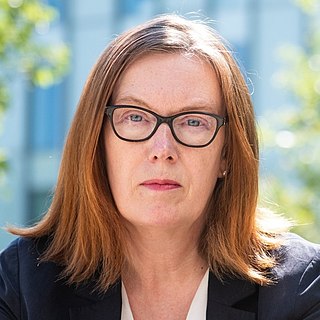Vaccine hesitancy is a delay in acceptance, or refusal of vaccines despite the availability of vaccine services. The term covers outright refusals to vaccinate, delaying vaccines, accepting vaccines but remaining uncertain about their use, or using certain vaccines but not others. The scientific consensus that vaccines are generally safe and effective is overwhelming. Vaccine hesitancy often results in disease outbreaks and deaths from vaccine-preventable diseases. Therefore, the World Health Organization characterizes vaccine hesitancy as one of the top ten global health threats.

Our World in Data (OWID) is a scientific online publication that focuses on large global problems such as poverty, disease, hunger, climate change, war, existential risks, and inequality.

Riko Muranaka is a medical doctor, journalist and recipient of the 2017 John Maddox Prize for fighting to reduce cervical cancer and countering misinformation about the human papilloma virus (HPV) vaccine dominating the Japanese media, despite facing safety threats. Despite the lack of evidence, the HPV vaccine is infamous in Japan due to misattributed adverse effects, with government suspending promotion and coverage. While the World Health Organization (WHO) safety and efficacy information about the vaccine is consistent with Muranaka's reporting, a court ruled against Muranaka in an unrelated slander lawsuit in 2016 for claims of alleged fabrication. Under threat of legal harassment by antivaccine activists, publishers declined some of her works including a book on the HPV vaccine.

Heidi J. Larson is an American anthropologist and the founding director of the Vaccine Confidence Project. Larson headed Global Immunisation Communication at UNICEF and she is the author of Stuck: How Vaccine Rumors Start and Why They Don't Go Away.
Children's Health Defense is an American 501(c)(3) nonprofit activist group mainly known for anti-vaccine propaganda and has been identified as one of the main sources of misinformation on vaccines. Founded under the name World Mercury Project in 2011, it is chaired by Robert F. Kennedy Jr. The group has been campaigning against various public health programs, such as vaccination and fluoridation of drinking water. The group has been contributing to vaccine hesitancy in the United States, encouraging citizens and legislators to support anti-vaccine regulations and legislation. Arguments against vaccination are contradicted by overwhelming scientific consensus about the safety and effectiveness of vaccines.

Del Matthew Bigtree is an American television and film producer as well as CEO of the anti-vaccination group Informed Consent Action Network. He produced the film Vaxxed: From Cover-Up to Catastrophe, based on the discredited opinions of Andrew Wakefield and alleges an unsubstantiated connection between vaccines and autism.

Dame Sarah Catherine Gilbert is a British vaccinologist who is a Professor of Vaccinology at the University of Oxford and co-founder of Vaccitech. Gilbert specialises in the development of vaccines against influenza and emerging viral pathogens. She led the development and testing of the universal flu vaccine, which underwent clinical trials in 2011. On New Year's Day 2020 Gilbert read on ProMED-mail about four people in China suffering from a strange pneumonia of unknown cause, in Wuhan, China. Within two weeks a vaccine had been designed at Oxford against the new pathogen. On 30 December 2020, the Oxford–AstraZeneca COVID-19 vaccine she co-developed with the Oxford Vaccine Group was approved for use in the United Kingdom. As of January 2022 more than 2.5 billion doses of the vaccine have been released to more than 170 countries worldwide.

Michael Joseph Ryan is an Irish epidemiologist and former trauma surgeon, specialising in infectious disease and public health. He is executive director of the World Health Organization's Health Emergencies Programme, leading the team responsible for the international containment and treatment of COVID-19. Ryan has held leadership positions and has worked on various outbreak response teams in the field to eradicate the spread of diseases including bacillary dysentery, cholera, Crimean–Congo hemorrhagic fever, Ebola, Marburg virus disease, measles, meningitis, relapsing fever, Rift Valley fever, SARS, and Shigellosis.

During a time of Social distance and limited contact with others, social media became an important place to interact. Social media platforms are meant to connect people and helped the world remain connected, largely increasing usage during the pandemic. Since many people are asked to remain home, they have turned to social media to maintain their relationships and to access entertainment to pass the time.
Yvonne "Bonnie" Maldonado is an American physician, pediatrician, and Professor of Pediatrics and of Health Research and Policy at Stanford University, with a focus on Infectious Diseases. She founded Stanford's pediatric HIV Clinic and now serves as Stanford University School of Medicine's Senior Associate Dean of Faculty Development and Diversity.

An immunity passport, immunity certificate, health pass or release certificate is a document, whether in paper or digital format, attesting that its bearer has a degree of immunity to a contagious disease. Public certification is an action that governments can take to mitigate an epidemic.
Natalie E. Dean is an American biostatistician specializing in infectious disease epidemiology. Dean is currently an assistant professor of Biostatistics at the University of Florida. Her research involves epidemiological modeling of outbreaks, including Ebola, Zika and COVID-19.
Plandemic: The Hidden Agenda Behind Covid-19 and Plandemic: Indoctornation are a 2020 conspiracy theory video and film, respectively. Both were produced by Mikki Willis and promote misinformation about the COVID-19 pandemic. They feature Judy Mikovits, a discredited American researcher who has been described as an anti-vaccine activist. The first video, in addition to promoting various conspiracy theories, also features Willis and Mikovits discussing viruses in general and Mikovits herself. Willis produced the first video with a low budget under the name of his production company Elevate Films. Three months after the video's Internet release, the second film Plandemic: Indoctornation, which also includes other people, was released by another distributor.
The Gamaleya Research Institute of Epidemiology and Microbiology, previously the N. F. Gamaleya Federal Research Center for Epidemiology & Microbiology, is a Russian medical-research institute within the Ministry of Health of the Russian Federation.

The Vaccine Confidence Project(VCP) founded in 2010 by Heidi Larson, was developed in response to hesitancy and misinformation on vaccination programmes such as those that caused a boycott of polio eradication efforts in Northern Nigeria in 2003–04. It is an early warning system to identify and evaluate public confidence in vaccines, with the purpose of tackling the problem early, when it is likely to be manageable.
Helen Petousis-Harris is a New Zealand vaccinologist and associate professor in the Department of General Practice and Primary Health Care at the University of Auckland. She has been involved in research related to vaccination in New Zealand since 1998, with her main areas of focus being vaccine safety and effectiveness. Petousis-Harris has had a variety of lead roles in New Zealand and international organisations that focus on vaccination and is a regular media spokesperson in this field, especially during the COVID-19 pandemic.
Misinformation related to vaccination and immunization circulates in mass media and social media. Intentional spreading of false information and conspiracy theories have also been propagated by the general public and celebrities. Misinformation related to vaccination fuels vaccine hesitancy and thereby results in disease outbreaks. Although opposition to vaccination has existed for centuries, the internet and social media has recently facilitated the spread of vaccine-related misinformation. Unsubstantiated safety concerns related to vaccines are often presented on the internet as scientific information.

Shabir Ahmed Madhi is a South African physician who is professor of vaccinology and director of the South African Medical Research Council Respiratory and Meningeal Pathogens Research Unit at the University of the Witwatersrand, and National Research Foundation/Department of Science and Technology Research Chair in Vaccine Preventable Diseases. In January 2021, he was appointed Dean of the Faculty of Health Sciences at the University of the Witwateratand.
Holly Witteman is a health informatics researcher. She is a Full Professor in the Department of Family & Emergency Medicine at the Université Laval, in Quebec City, Canada. Witteman is the Canada Research Chair in Human-Centred Digital Health.
The Lancet letter was a statement made in support of scientists and medical professionals in China fighting the outbreak of COVID-19, and condemning theories suggesting that the virus does not have a natural origin, which it referred to as "conspiracy theories". The letter was published in The Lancet on February 19, 2020, and signed by 27 prominent scientists, gaining a further 20,000 signatures in a Change.org petition. The letter generated significant controversy over the alleged conflict of interest of its authors, and the chilling effect it had on scientists proposing that the COVID-19 lab leak theory be investigated.










